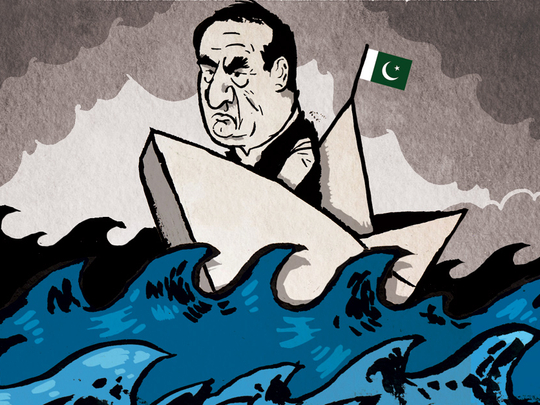
A by-election in Pakistan’s central city of Multan on Thursday to elect a new member of parliament evoked unprecedented interest across the country and for good reason.
Javed Hashemi, a prominent politician with a reputation for being a maverick and backed by Prime Minister Nawaz Sharif’s ruling Pakistan Muslim League–Nawaz (PML-N) political party, lost to his rival, who was supported by the Pakistan Tehreek-e-Insaaf (PTI) political party led by cricketing legend Imran Khan.
Under a different set of circumstances, the outcome to this singular contest would have easily gone by without much notice. Yet, Pakistan is right in the midst of a series of trendsetting events that will shape the country’s future. For more than two months, Imran alongside moderate Islamic scholar Tahir-ul-Qadri, have together led a public protest just outside the parliament in Islamabad to press for sweeping electoral reforms. Sharif’s ruling structure has so far failed to either end the political deadlock caused by the protests through successful negotiations or tactful use of force to end the demonstration.
In the meantime, both Qadri and Imran are venturing out to lead political gatherings all over Pakistan, to powerfully amplify their message of dissent against Sharif’s government. One very visible outcome of their campaign has been the popularity quickly gained to the ‘Go Nawaz, Go’ slogan crafted by the two men.The protests have clearly dented the government’s standing in more ways than one. Notwithstanding the official claims of success, confidence among prospective investors is clearly heading southward while political pundits are increasingly predicting midterm elections. For Sharif who built part of his credentials by seeking to present a ‘business-friendly image’ surrounding his rule, scepticism from business leaders has clearly been a potent setback.
Possible cabinet reshuffle
And last but not the least, the dysfunctional state of Pakistan is evident nowhere more than a quick glance at the virtual absence of progress made by the parliament to help consolidate the country’s otherwise young democracy. The past week has once against witnessed reports in segments of the Pakistani press about a possible cabinet reshuffle in the near future. This may or may not come. Yet, it is clear that Sharif has presided over a political ship that has landed in increasingly choppy waters. There are two clear manifestations of this trend.
On the one hand, the past year has amply demonstrated the ruling structure’s failure to begin tackling the most formidable challenges faced by Pakistan. In the midst of the worst energy crisis in Pakistan’s history, there has been little evidence of putting in place a lasting solution to the ordeal of Pakistanis living in darkened homes with hours of electricity cuts. Though there appears to have been a relative improvement in the supply of electricity in recent weeks, this has clearly come at a cost. In recent days, Pakistanis have heard a widely noticed outcry from ordinary consumers incensed at being slapped with hugely inflated electricity bills. Is this the ruling structure’s solution to tackling a fundamentally inefficient and graft-stricken national electricity generation and supply system? To that obvious question, the answer must be in the affirmative for now.
On the other hand, the obviously dysfunctional state of Pakistan’s parliament must raise compelling questions over the quality of the country’s public representatives. In the past week came news of the Pakistan election commission’s decision to suspend the membership of more than 200 federal and provincial lawmakers, after they failed to submit details of their assets in compliance with an earlier order. Exactly why would lawmakers conveniently ignore calls to make them accountable to the law may be mind boggling. And yet, that’s perfectly understandable in Pakistan’s context. In the past year, members of the country’s federal and provincial legislatures have shown little regard for aggressively tackling the most vital popular issues and instead chose to promote self interest wherever possible
Beyond the obvious matter of the energy crisis, Pakistan needs firm and decisive action to tackle vast gaps in areas like state provided health care or education. Yet, the cause of reforms in Pakistan has been badly ignored over time. The past year has indeed been no different from the country’s unfortunate historical legacy.
Going forward, the writing on the wall is indeed abundantly clear. Sharif’s ability to steer Pakistan out of its moment of crisis is increasingly challenged while the country’s outlook continues to slip. In this background, the outcome of Thursday’s political contest in Multan should be seen not just as a one-off vote but indeed a timely reminder of emerging trends.
The people of Pakistan appear to have resigned themselves to a ruling order that has done little to meaningfully tackle the worst set of challenges confronting the country today. Though the exact coming turn of events remains unclear, the direction appears to have been set.
In the meantime, recent events have also been a timely reminder of areas where hope may still lie for the future of Pakistan. The awarding of the globally acknowledged Nobel Prize to Malala Yousufzai has indeed been a well-deserved recognition of the courageous example set by this Pakistani teenager who was shot by the Taliban in the northern Swat Valley for speaking out repeatedly for the cause of girls’ education.
Like her, there are many other heroic examples of Pakistanis who have silently gone about their lives and pushed the envelope for the right reasons. They, more than Pakistan’s present day ruling politicians, deserve to be acknowledged as the best hope for the country’s unfolding future.
Farhan Bokhari is a Pakistan-based commentator who writes on political and economic matters.







